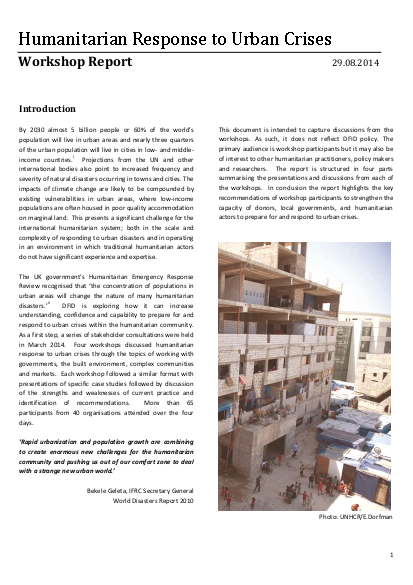
The UK government’s Humanitarian Emergency Response Review recognised that ‘the concentration of populations in urban areas will change the nature of many humanitarian disasters.’ii DFID is exploring how it can increase understanding, confidence and capability to prepare for and respond to urban crises within the humanitarian community. As a first step, a series of stakeholder consultations were held in March 2014. Four workshops discussed humanitarian response to urban crises through the topics of working with governments, the built environment, complex communities and markets. Each workshop followed a similar format with presentations of specific case studies followed by discussion of the strengths and weaknesses of current practice and identification of recommendations. More than 65 participants from 40 organisations attended over the four days.
This document is intended to capture discussions from the workshops. As such, it does not reflect DFID policy. The primary audience is workshop participants but it may also be of interest to other humanitarian practitioners, policy makers and researchers. The report is structured in four parts summarising the presentations and discussions from each of the workshops. In conclusion the report highlights the key recommendations of workshop participants to strengthen the capacity of donors, local governments, and humanitarian actors to prepare for and respond to urban crises.
Resource collections
- Accountability to affected populations (AAP)
- ALNAP focus topics
- Evaluating humanitarian action
- Innovation
- UN Habitat - Urban Response Collection
- Urban Response - Urban Crisis Preparedness and Risk Reduction
- Urban Response Collection - Community Engagement and Social Cohesion
- Urban Response Collection - Economic Recovery
- Urban Response Collection - Environment and Climate Change
- Urban Response Collection - Housing, Land and Property
- Urban Response Collection - Urban Crisis Response, Recovery and Reconstruction
- Urban Response Collection - Urban Resilience